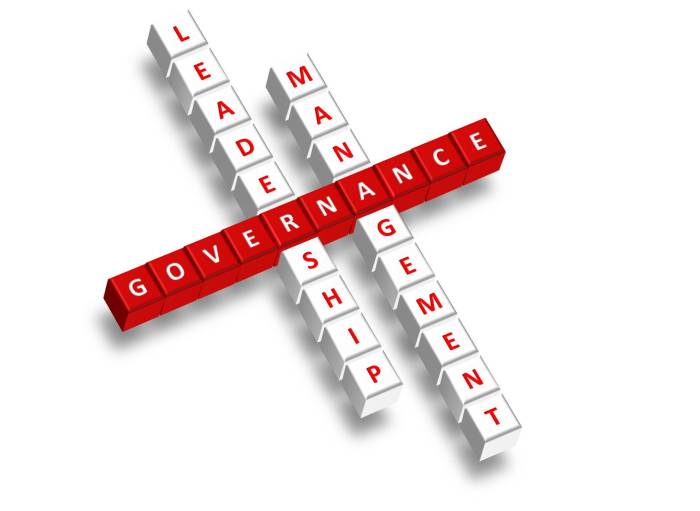What element of QAPI is governance and leadership responsible for? This question lies at the heart of understanding the critical role governance and leadership play in the success of Quality Assurance and Performance Improvement (QAPI) programs. In this discussion, we will delve into the multifaceted responsibilities of governance and leadership in QAPI, exploring their involvement in strategic planning, resource allocation, performance measurement, and more.
Governance and leadership set the foundation for QAPI by establishing a clear structure, defining roles and responsibilities, and ensuring accountability. They provide strategic direction, allocate resources, and monitor performance to drive continuous improvement. Their commitment to QAPI creates a culture of excellence, fostering innovation and enhancing patient outcomes.
Governance Structure and Accountability

Governance and leadership play a critical role in establishing a robust QAPI program by providing oversight, ensuring accountability, and monitoring performance.
Roles and Responsibilities of the Governing Body
- Approve and adopt QAPI policies and procedures.
- Oversee the implementation and evaluation of QAPI initiatives.
- Hold management accountable for QAPI performance.
- Provide resources and support for QAPI activities.
Ensuring Accountability
- Establishing clear roles and responsibilities for QAPI implementation.
- Regularly reviewing and assessing QAPI progress and outcomes.
- Taking corrective action when necessary to address deficiencies.
- Holding individuals accountable for their contributions to QAPI.
Monitoring and Evaluating Performance
- Establishing performance measures to track QAPI progress.
- Collecting and analyzing data to assess QAPI effectiveness.
- Using data to inform decision-making and drive continuous improvement.
- Reporting QAPI performance to the governing body and other stakeholders.
Leadership Engagement and Support

Leadership engagement is essential for the success of any QAPI program. Leaders must demonstrate their commitment to QAPI and create a culture of continuous improvement.
Importance of Leadership Engagement
- Sets the tone for the organization’s commitment to quality and patient safety.
- Provides resources and support for QAPI activities.
- Empowers staff to participate in QAPI initiatives.
- Creates a culture of accountability and transparency.
Demonstrating Commitment
- Actively participating in QAPI activities.
- Communicating the importance of QAPI to staff and stakeholders.
- Recognizing and rewarding staff for their contributions to QAPI.
- Providing resources and support for QAPI initiatives.
Fostering a Culture of Continuous Improvement
- Creating a safe and supportive environment for staff to report errors and concerns.
- Encouraging staff to participate in QAPI initiatives.
- Using data to inform decision-making and drive continuous improvement.
- Celebrating successes and learning from mistakes.
Strategic Planning and Goal Setting

Governance and leadership play a key role in establishing strategic goals for QAPI and developing a plan to achieve those goals.
Establishing Strategic Goals
- Aligning QAPI goals with the organization’s mission and vision.
- Identifying key areas for improvement.
- Setting specific, measurable, achievable, relevant, and time-bound (SMART) goals.
- Prioritizing QAPI goals based on their importance and feasibility.
Developing a QAPI Plan
- Outlining the steps that will be taken to achieve QAPI goals.
- Identifying the resources and support that will be needed.
- Establishing a timeline for implementation.
- Monitoring progress and making adjustments as needed.
Resource Allocation and Budgeting: What Element Of Qapi Is Governance And Leadership Responsible For

Governance and leadership must ensure that adequate resources are allocated to support QAPI activities.
Role of Governance and Leadership
- Approving the QAPI budget.
- Prioritizing QAPI activities based on their importance and feasibility.
- Allocating resources to support QAPI initiatives.
- Monitoring the use of QAPI resources.
Prioritizing and Budgeting
- Identifying the most important QAPI activities.
- Estimating the costs of QAPI activities.
- Allocating resources to the most important QAPI activities.
- Ensuring that QAPI activities are financially sustainable.
Performance Measurement and Evaluation
Governance and leadership must establish performance measures to track QAPI progress and evaluate its effectiveness.
Establishing Performance Measures
- Identifying key QAPI outcomes.
- Developing specific, measurable, achievable, relevant, and time-bound (SMART) performance measures.
- Selecting performance measures that are aligned with the organization’s goals.
- Using data to track progress and identify areas for improvement.
Using Data to Drive Continuous Improvement
- Collecting and analyzing data to assess QAPI performance.
- Using data to identify trends and patterns.
- Making data-driven decisions to improve QAPI activities.
- Reporting QAPI performance to the governing body and other stakeholders.
Communication and Transparency
Effective communication is essential for the success of any QAPI program. Governance and leadership must ensure that QAPI goals, progress, and results are communicated to stakeholders.
Importance of Communication
- Keeps stakeholders informed about QAPI activities.
- Builds trust and support for QAPI.
- Facilitates collaboration and teamwork.
- Encourages feedback and input from stakeholders.
Communicating QAPI Goals, Progress, and Results, What element of qapi is governance and leadership responsible for
- Using a variety of communication channels to reach stakeholders.
- Tailoring messages to the specific audience.
- Providing regular updates on QAPI progress.
- Reporting QAPI results to the governing body and other stakeholders.
Building Trust and Support
- Being transparent about QAPI activities.
- Responding to stakeholder concerns and feedback.
- Celebrating successes and learning from mistakes.
- Building relationships with stakeholders.
Essential Questionnaire
What is the primary role of governance in QAPI?
Governance establishes the overall framework for QAPI, ensuring accountability and overseeing its implementation.
How does leadership demonstrate its commitment to QAPI?
Leadership demonstrates its commitment through active engagement, resource allocation, and fostering a culture of continuous improvement.
What is the importance of strategic planning in QAPI?
Strategic planning aligns QAPI goals with the organization’s mission and vision, providing a roadmap for improvement efforts.